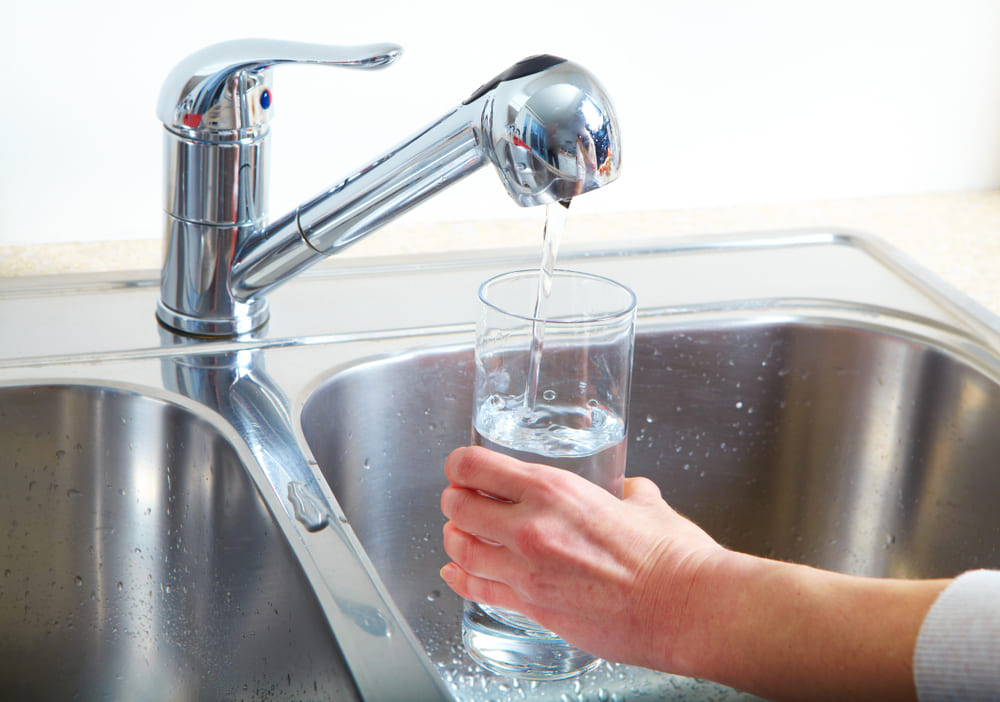
Almost all water from wells and municipal water supplies has at least some minerals in it. These minerals in the water can be healthy for you in small doses; however, they can also spell trouble for homes with too many minerals in the water supply. Water with an excess amount of minerals in it is known as hard water.
Table of Contents
Hard water impacts many different parts of the country and can cause severe problems for your home’s plumbing if you don’t deal with it quickly. However, if you’re new to homeownership or have never lived in a home with hard water, it’s normal to feel confused about what to do and how to keep hard water from becoming a problem.
How to Tell If You Have Hard Water
Trying to decide if your home has hard water? Here are a few proven things to look for:
- Speckles on glass: Hard water causes mineral deposits to collect anywhere that water droplets dry. If you see white spots on glass in your bathroom or see white speckles on your chrome hardware, it’s likely that you have hard water.
- Clogged shower heads: Minerals also collect in your fixtures, and the best place to check for buildup is your shower head. If the spray nozzles have white buildup or are spraying water in odd directions, you likely have hard water.
- Residue on your dishes: If your dishes look cloudy as soon as they come out of the dishwasher, it’s likely that you have hard water flowing through your pipes.
Your plumber can also inspect your water and determine if there are too many minerals in the supply by comparing the results against a water hardness table like this one:
| Mineral Content | Hardness |
| 0 – 60 mg/L | Soft |
| 61 – 120 mg/L | Moderately Hard |
| 121 – 180 mg/L | Hard |
| 181 mg/L and higher | Very Hard |
If they determine that you have hard water in your home, they’ll help create a plan to remedy it so your plumbing can last longer.
How Hard Water Affects Your Plumbing
When it comes to understanding hard water, you need to know how it impacts your plumbing. Hard water does more than cause visible buildup on your plumbing fixtures. It can also hurt the plumbing itself. Here are a few common ways that hard water affects your plumbing.
Causes Clogs
Mineral buildup can collect inside pipes, in water intake lines, in shower heads, and even inside your toilet’s sewer connection. Small amounts of buildup aren’t a problem, but large amounts can end up causing clogs. Once you have a clog in place, water won’t flow freely, and you’ll need to schedule an emergency plumbing appointment as soon as possible.
Decreased Water Pressure
Clogs in water intake lines and plumbing fixtures can also impact your home’s water pressure. The mineral buildup effectively makes the opening smaller, reducing the amount of water that flows out of your fixtures at any given time. You’ll likely notice a decrease in water pressure.
Pipe Corrosion
The mineral buildup also has different acid content than soft water. This can cause corrosion in your pipes which, if left untreated, increases the likelihood of leaks and severe damage down the line.
How Hard Water Affects Items in Your Home
Hard water can also affect the individual plumbing fixtures in your home. Here’s how.
- Cuts Down Water Heater Lifespan
Hard water can greatly reduce your water heater’s lifespan. Once the buildup happens, your water heater must work harder. This causes more wear and tear, forcing you to replace it sooner than you should.
- Slow Flushing Toilets
Hard water buildup can cause a narrowing in your toilet’s sewer connection. When buildup happens, it can take longer for your toilet to flush each time you use the bathroom. Over time, it’s normal for the buildup to eventually cause a clog.
- Slow Draining Sinks
The same way mineral deposits can clog your toilet can also happen in your sink’s drains. Minerals collect in the drain and build up over time. This decreases the amount of room water has to drain out of your sink, causing it to drain more slowly.
- Cuts Down Appliance Lifespan
Hard water buildup can reduce the lifespan of major appliances like your dishwasher, washing machine, water heater, and more. The minerals can lead to corrosion and excessive wear and tear on your appliances’ components.
How to Manage Hard Water
The best way to manage hard water buildup is to work with your experienced residential plumber. They’ll be able to assess the exact hardness of your water and determine the best course of action. For homes with moderate to extremely hard water, installing a water softener may be a great choice. Your plumber can tell you if you need a water softener.
Water softeners neutralize the excess mineral content, thereby reducing the amount of buildup that can form in your home’s plumbing fixtures. Water softeners aren’t something the average homeowner can install on their own. If you’re interested in a water softener, speak with your plumber. They’ll be able to install it correctly and choose the right type of water treatment for your home’s needs.
Conclusion
Hard water doesn’t have to be a major problem for your home. Deal with hard water as soon as you notice a buildup in your home’s plumbing fixtures. The best way to deal with buildup and keep it from getting worse is to schedule an appointment with an experienced plumber to help with all of your plumbing needs.

